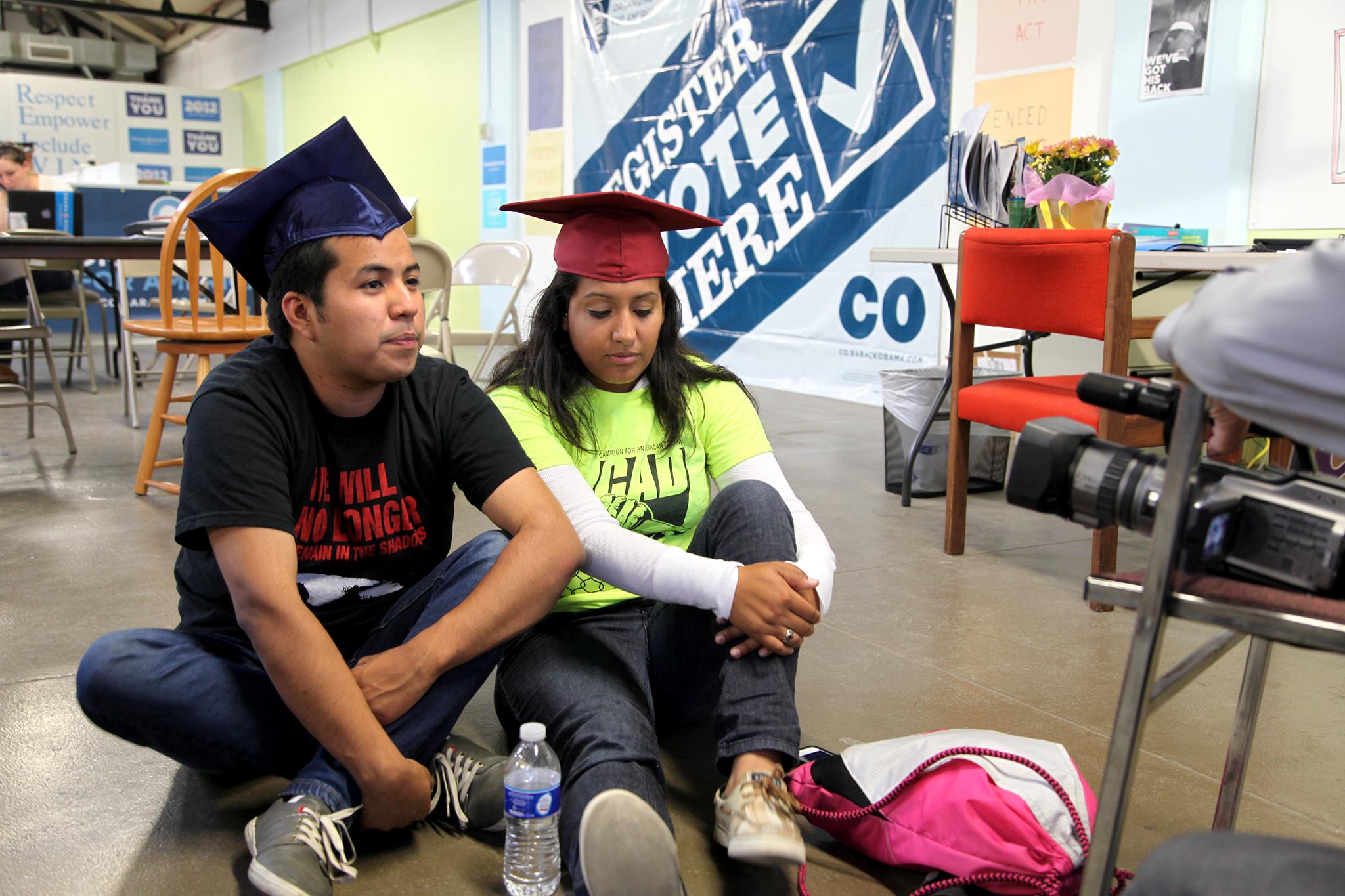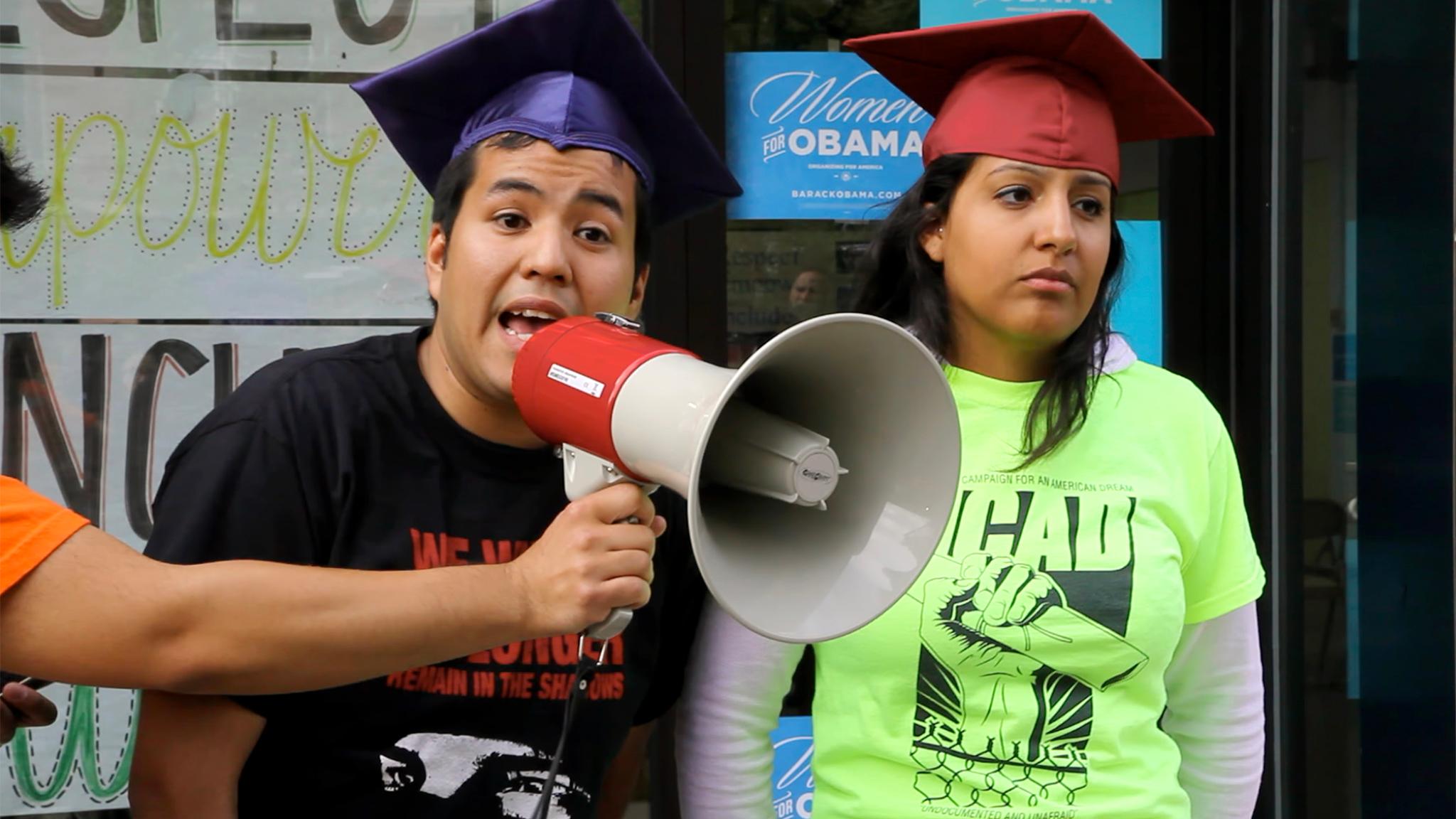On a warm day in June 2012, Javier Hernandez and Veronica Gomez had a plan. Both in their 20s, Hernandez had been living in Colorado for about a year, and Gomez was passing through. That day they walked into an office on Acoma Street and 9th Avenue, just off Speer Boulevard in Denver. It was the local headquarters of the Obama for America re-election campaign. Hernandez and Gomez wanted to get the candidate's attention.
They had a singular message. They wanted Obama to take executive action to stop deportations of Dreamers like themselves. Congress had failed to pass a bipartisan immigration bill two years earlier, and Hernandez and Gomez knew they couldn't count on Congress to take action anytime soon. They saw Obama as their only real hope.
Obama had guaranteed to take action on immigration reform in his first term. Instead, he had deported record numbers of people, and while he focused on those with criminal records, young people without criminal histories were also swept up in the wave of deportations. As Obama sought the support of the Latino community in his re-election bid, advocates wanted to force his hand.
That day in June, Hernandez wore a black T-shirt with red letters that said, "We will no longer remain in the shadows." He and Gomez were both brought to the U.S. by their parents as young children and had not gained legal status in this country. They had grown up knowing only the U.S. as their home, yet without all the opportunities afforded to citizens.
Hernandez said their plan to show up and refuse to leave a campaign office could have gotten them arrested for trespassing and put them on a path to getting deported. Looking back on it recently, he said he knew the risks, but he wasn't afraid. In fact, he said getting arrested was the goal.
"We're gonna sit down on the floor and eventually they're going to call the cops and we're going to get arrested," Hernandez remembered thinking. "We had this whole legal plan ready to go."
They had been advocating for years, but Hernandez wanted to make this moment really stand out, not just for himself and Gomez, but for all the undocumented young people in Colorado and around the country. He remembered thinking, "Let's make sure that the administration knows we're serious. We want to see something, and it has to be strong."
Their day did not go according to plan.
Supporters and television cameras set up outside the Obama campaign office that day, ready to see what happened to the two Dreamers.
"It was palpable, it was tense, it was exciting, and it felt like, 'You know what, we have nothing to lose,'" said Julie Gonzales, who was there as an organizer and is now a state senator.
But Hernandez and Gomez did not get arrested. Instead, Obama campaign staffers told them they could stay.
The Dreamers quickly regrouped and decided to start a hunger strike in the office instead. Hernandez recalled sitting on the floor in the middle of the campaign office, he and Gomez tapping their screens, trying to figure out how a hunger strike works.
"It was, like, we realize that we're not going to survive off water," he said.
They thought it would last at least five days.
"We needed Gatorade, we needed Pedialyte," he said.
They set timers so they knew when they needed to drink more.
Gonzales considers the action Hernandez and Gomez took that day as part of a long line of protest movements carried out by Latinos and Chicanos in Colorado. She points to the student walkouts in 1969 at West High School, which also saw young people standing up for themselves and their community, and immigrants rights marches in 2006.
The demonstration in Denver in 2012 was the apex of a 3,000-mile walk from California to Washington, D.C. in which young Dreamers and advocates alike called on Obama to take action to protect them from deportation. Each young person in the group had a story about how being undocumented had affected them or a friend or family member.
Hernandez said his undocumented status complicated his career aspirations after high school.
"I honestly think when it became obvious -- when it became a problem -- would have to be [when I was] getting close to graduating high school and then trying to figure out what to do to go to college," he said.
He said he got bad advice from a school counselor who thought he wasn't allowed to attend college at all. While that wasn't true, he graduated in the middle of the recession, had little money to pay for college himself, and didn't qualify for federal or state financial aid in California. State law prohibited him from getting a driver's license as an undocumented immigrant, which he needed to get to work and school.
Going into the Obama campaign office, Gomez told documentary filmmakers, who were following the group for a film they released later called American DREAMers, that despite having graduated college, her only real option for employment was babysitting since she lacked legal authorization to work. She figured she didn't have much to lose. She and Hernandez wore their graduation caps to their sit-in.
They fasted at the campaign headquarters continuously for six days. Denverites rallied outside the office, and the television cameras, particularly from Univision, continued to roll. Hernandez and Gomez decided to shut down the hunger strike after nearly a week, knowing they had sparked something that would last: Other young people had plans to occupy Obama campaign offices in other states, to keep the momentum going.
Just a few days later, President Obama delivered what Hernandez and Gomez had asked for: He announced, through executive order, the Deferred Action for Childhood Arrivals program. Since its inception, DACA has helped more than 800,000 people who were brought to the U.S. as children, mostly from Mexico, get temporary relief from deportation.
Gonzales remembers Hernandez's and Gomez's protest as a "jolt."
"I recall it happening very quickly that this sit-in took place," she said, "and then very soon thereafter the president announced the creation of the DACA program."

Jonathan Alcantar, associate professor of Chicano, Chicana and Latinx Studies at the University of Northern Colorado, said the protest was critical. "Even though we don't have a particular date or action that you can say, 'This is the origin of the Dreamers movement,' I think in terms of politics and the impact on the political sphere, this was the moment."
Recounting the Denver demonstration in her book, "Once I Was You," the journalist Maria Hinojosa went further. She called it a "public shaming" of President Obama, which she said led straight to DACA.
"These young activists had taken the risk of putting their bodies on the line and they had been seen," she wrote.
Hernandez was elated when the program was announced; it was more than he'd asked for. DACA gave eligible people work permits and allowed people like him to travel to their birth countries to visit family they perhaps hadn't seen in decades. But Hernandez said he also knew that DACA wouldn't cover everyone, not even all the young people. Some had come to the U.S. outside of DACA's strict timeline. So his fight, and the fight of countless others, has continued.
DACA has had a lasting impact on Colorado.
More than 18,000 Coloradans have gotten DACA protections over the last nine years. While DACA recipients came to the U.S. as children, many are now in their 30s.
Gonzales said the promise behind the executive order was that people who were given the chance to work and live legally in the U.S. would give back, and they have.
"In 2021, we have DACA recipients serving on boards and commissions in Colorado, who are teachers, who graduated, who are now giving back to [the] community," she said.
Alcantar said some of his students at UNC are DACA recipients, and he sees their impact on higher education.
"Education has been the path for social mobility for Latinos in general, and when it comes down to undocumented students, particularly Dreamers, it's even more important," he said.
Gonzales also sees the legacy of the demonstration at the Obama campaign office reflected in state policy.
"It created space for us to take action directly for [the] community at the state level, while continuing to push for Congress to not be broken anymore," she said.
In 2013, the state legislature passed the ASSET law, which allows undocumented Colorado high school graduates to pay in-state tuition -- before, they had to pay full tuition. State lawmakers also allowed undocumented immigrants to get driver's licenses. The legislature has passed several other measures aimed at protecting immigrants, including a 2018 resolution urging Congress to give Dreamers a pathway to citizenship.
That would be necessary because the federal DACA program didn't provide a legal pathway to citizenship for recipients, despite pleas from immigrants and some lawmakers, and the protections it did provide were never guaranteed to be permanent. The Obama administration tried but failed to expand DACA in 2014. In 2017, the Trump administration tried to cancel the program. A federal judge in Texas is now considering a case that could end the program altogether, and therefore end the temporary legal status of hundreds of thousands of Dreamers.
During his presidential campaign, Joe Biden vowed to protect DACA and expand eligibility for student financial aid to immigrants. The U.S. House of Representatives went further last month when it passed a version of the DREAM Act, a proposal which Biden supports. But the bill's passage in the Senate is far from guaranteed.
It's been 20 years since the DREAM Act was originally introduced. Had it passed then, it would have made Dreamers eligible to become legal permanent residents. With the federal lawsuit in Texas threatening to end DACA at the same time the president and Democratic leaders in Congress say they want to provide a path to citizenship, Alcantar at UNC said the uncertainty that many people feel right now is palpable.
"If there's anything that Dreamers and undocumented youth are used to, it's just living in this limbo," Alcantar said. "Obviously immigration has always been a political topic that has been used by political parties in different ways. And that's why a lot of Latinos, I think they're tired of being that little political pawn in between political parties. We need a real solution."
Hernandez no longer relies on DACA himself; he got a green card through marriage. But he is still a leader in the immigrant rights movement, now in California.
He said he is particularly tired from all the fights against the Trump administration over the past four years. But he said he is also inspired. He wants to see other people do something bold like he did in Denver in 2012.
"We want 11 million people to be legalized in this country," he said.
Looking back, he said DACA was a first step.
"But it definitely shouldn't be the last thing that we do."












